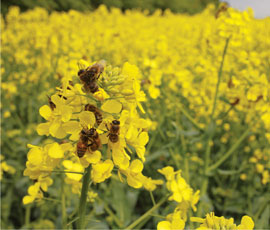NFU backs Syngenta’s EU neonic legal challenge

The NFU is to intervene in support of Syngenta’s legal bid to reverse a ban on neonicotinoid pesticides linked to a decline in bee health.
NFU president Peter Kendall confirmed: “We will support Syngenta’s legal challenge of the European Commission’s hasty restrictions on certain neonicotinoids, including thiamethoxam, distributed by Syngenta as Cruiser. We are planning direct intervention in the case.”
Restrictions on the use of four neonicotinoid seed treatments, including Syngenta’s thiamethoxam (Cruiser), will come into effect across the EU from 1 December, on bee-attractive crops, including oilseed rape, maize and sunflowers.
The European Commission pushed through a two-year suspension on the use of four neonicotinoids – clothianidin, imidacloprid, thiamethoxam and fipronil – following advice from the European Food Safety Authority (EFSA) which concluded these products posed an “unacceptable risk” to bees and other pollinators.
The UK government, the NFU and Syngenta said the commission’s decision to ban these products was largely based on lab studies in which bees were exposed to much higher doses of pesticides than when they are in the field.
Syngenta has just released the findings of its own field research carried out between 2005 and 2010 in France into the effects of thiamethoxam on bee health.
The study, published in the peer-reviewed journal PLOS ONE, found no difference in the health of bees between control hives and those adjacent to flowering crops treated with thiamethoxam.
Syngenta’s legal challenge was officially published in the Official Journal of the European Union on 9 November. The NFU confirmed it would submit a direct intervention in support of the case within the permitted six-week period.
If the EU grants the NFU leave to intervene in the case, it will then submit a written statement to support Syngenta. The process will involve the NFU incurring legal costs, which will be covered by its Legal Assistance Scheme. However, no funding is being exchanged between the NFU and Syngenta to cover this case.
The NFU said its intervention would be based on getting across the farmer’s perspective and the impact over the loss of these “vitally important” products. The case highlighted its wider concerns over “poor decision-making at EU level, not based on sound science”.
Stephen Beal, Syngenta’s seed treatment business leader, said: “Bee health is a multi-factorial issue and simply banning neonicotinoids won’t solve the problem.
“We believe seed treatments are the most effective, environmental and sustainable way of controlling pests. Losing these products will be hugely problematic for the establishment of oilseed rape crops, as aphids and flea beetles can be extremely detrimental to yields.”
Bayer CropScience and BASF have launched separate EU lawsuits to challenge bans on their neonicotinoid products.
But Peter Melchett, policy director of the Soil Association, said there was “overwhelming evidence” that neonicotinoids are damaging pollinators.
What’s the plan now neonicotinoids are banned?
Studies show neonicotinoids ‘not linked to bee deaths’

